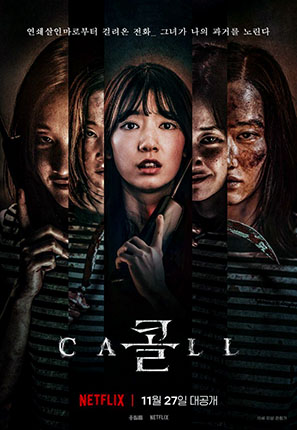
Two people live in different times. Seo-Yeon lives in the present and Young-Sook lives in the past. One phone call connects the two, and their lives are changed irrevocably.
The Call: Asian Horror Movie Reviews
There was a buzz on the interwebs and Facebook of a new Netflix film entitled The Call. Hailing from South Korea, the film is about a mysterious connection between two women by telephone from two different eras – one of the past, the other of the future. Their lives intermingle where Young Sook, the woman of the past, lives a troubled life until she takes matters into her own hands and turns her life around, which has dire consequences to Seo-Yeon in the present/future. Seo-Yeon learns that Young Sook is a manic serial killer in the past and is at her mercy as she can manipulate things in the past that will affect her in the future. The Call is the first feature film by director Chung-Hyun Lee whose only other credit, to date, is a short film he directed and produced, Bargain, in 2015.
The Call is South Korea’s answer to the 2000 American film Frequency starring Dennis Quaid and Jim Caviezel, of which I am a big fan of that film. Although similar in plot, The Call stood on its own as it is different from Frequency in execution and style. In Frequency, the connection between the main protagonist and his long-dead father talk through a ham radio (his father’s who uses the same radio in the past) seems to be attributed to an aura borealis. In The Call, the phone calls happen without rhyme nor reason through an old cordless phone.

While I enjoyed a large chunk of the movie, a few things didn’t bide well for me. For starters, the element of time didn’t seem to be appropriately utilized. I am no scientist, but I have seen my fair share of movies to chime in on the subject; besides, there are some things I can question using basic knowledge and logic. When something in the past is changed, then the future will also be altered, the butterfly effect, a hypothetical situation that illustrates how small initial differences may lead to significant unforeseen consequences over time.
For example, in The Call, the memories of Seo-Yeon would also alter as her past is changed. Everything happened in real-time, where if someone in the past is killed, Seo-Yeon is the only person to remember said person in the present time. In contrast, everyone else never knew or heard of the person because said person died before they ever met. Seo-Yeon met said person in her present time, but once said person was killed in the past, then present/future Seo-Yeon would cease to know said person ever existed even if said person was in the room with her only mere moments ago. In essence, that person would be erased from her timeline, and she would have no memory. I could be wrong, though. The same idea would apply to anyone else, and it did, but for some reason, not to Seo-Yeon.

Another example is if Seon-Yeon was hurt in the past, then there is no way that she can feel that pain of being injured in the future simultaneously. Maybe I’m nitpicking too much because, of course, it is a movie. I was also not a fan of the film’s conclusion, a rarity because I am usually a fan of the twists in South Korean cinema. There are two endings on this one: a false ending that I was OK with, but they had to keep it going as if trying to generate that shock ending but instead left me scratching my head because it did not make a whole lot of sense.
Despite my dissatisfaction with the film’s conclusion, I enjoyed ninety percent of the movie. There were no scares in this one, so if that’s what you were hoping for, then look elsewhere because there are none in The Call. The film is more thriller and mystery than horror, and there are more than a few moments that were tense and had me on the edge of my seat. The Call is worth a watch, but I would say that Frequency was overall a better-made film with heart.
